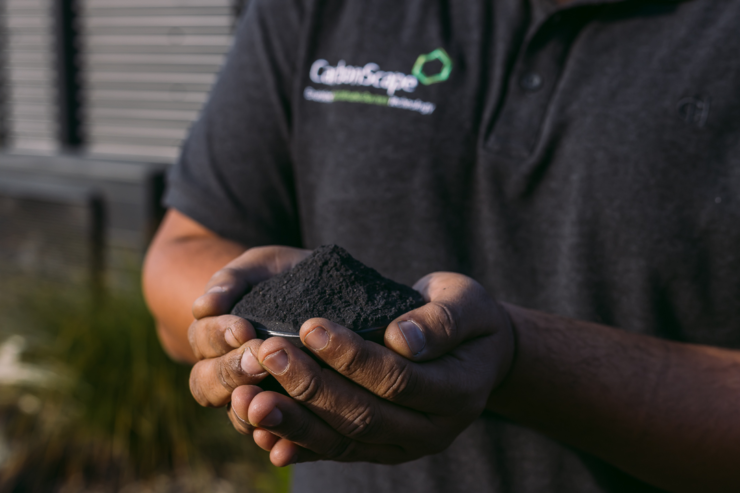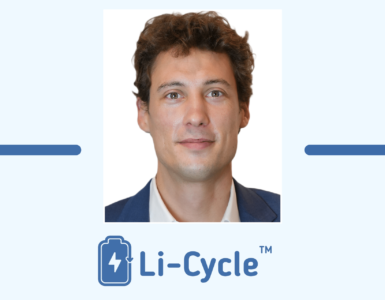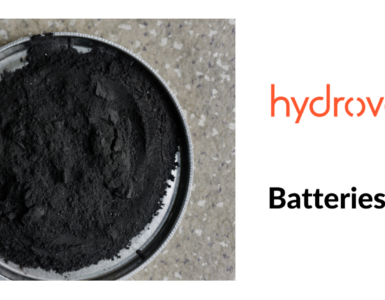Powering Tomorrow – CarbonScape Biographite Revolutionizes Lithium-ion Batteries and Sustainability, an Interview with Batteries News.
CarbonScape is the first-to-market producer of sustainable biographite. The New Zealand-based deep tech biomaterials company began development of biographite in 2016, with a vision to replace fossil carbons with renewable carbon products. Its patented biographite technology offers the global lithium-ion battery industry a drop-in alternative to synthetic and mined graphite, enabling local production, high performance, and a negative carbon footprint. At up to 50 per cent of the weight of a lithium-ion battery, graphite fills the largest portion, and is a critical material in the global shift to clean energy. For more information, visit: https://www.carbonscape.com/
About Ivan Williams, CEO of CarbonScape:
With more than 25 years of international business experience in the renewable energy and sustainability markets, Ivan brings a track record in business acumen and leadership. Originally from Marlborough, New Zealand, Ivan returned from Europe in February 2019 to join CarbonScape as the Operations Director before becoming CEO in November 2019. Ivan holds an honours degree in Chemical and Process Engineering from the University of Canterbury.
🔥 What about we co-host a webinar? Let's educate, captivate, and convert the battery economy!
Batteries News is the global go-to online magazine for the battery industry, we can help you host impactful webinars that become a global reference on your topic and are an evergreen source of leads. Click here to request more details
- What is your vision for CarbonScape and biographite? What inspired this?
CarbonScape’s vision is to secure and decarbonise graphite supply chains, enabling a faster transition to net zero. It became clear to us that both the looming global shortage of graphite for lithium-ion batteries and the lack of supply chain diversification posed a significant threat to countries’ plans to shift to clean energy and transport and thus, achieving global climate goals. We are inspired every day to find continue developing solutions to these significant global challenges.
- What are the key challenges facing the lithium-ion battery market?
There are four key challenges facing the market:
1. Supply shortfall – it needs to secure enough supply to meet exploding demand: there is a predicted graphite shortfall of 777,000T annually by 2030. Without addressing this fundamental challenge, countries cannot achieve their net zero ambitions.
2. Supply chain risk, due to China’s dominance – China refines over 90% of the world’s high-quality graphite. With China recently announcing plans to restrict exports, this begs the question: how can states rapidly diversify and localise their supply chains?
3. Dependence on high-emission processes and mining – the production of ‘traditional’ synthetic graphite relies on fossil fuel-based feedstocks and highly polluting manufacturing processes. Natural graphite depends upon mining, which is environmentally damaging.
4. Finite resources – supplies of many raw materials for batteries are finite. So, the sector needs to create circular economies and kickstart a recycling revolution to safeguard the transition to clean transport and energy systems.
- Which of these is biographite addressing? How is it addressing them?
Biographite Is produced from forestry by-products, such as wood chips, enabling production to be localised to wherever a local forestry industry exists and can be rapidly scaled to meet demand. Our carbon negative process curtails waste and carbon emissions from a sustainable industry, establishing a circular economy within it.
As graphite demand continues to rapidly grow, the market will become increasingly competitive, posing additional supply chain risk and cost uncertainty for cell and battery manufacturers in particular. Biographite offers them supply chain security and cost certainty, whilst cutting the carbon footprint of each battery by almost a third.
- How did you come up with biographite?
We discovered how to make our carbon-negative product while working on a solution to another problem: using microwave technology to produce green coke to decarbonise steel production. As the grave implications of the impending global shortage of graphite for the battery market became clear to us, we pivoted towards producing a sustainable alternative to this critical material instead.
- What is biographite? How does it differ to other types of graphite? Will it compete with them for market share?
Biographite is a high-performing, cost competitive, and carbon-negative alternative to both mined and synthetically produced graphite – a critical material for lithium-ion batteries. Having spent the last three years testing our product with leading battery manufacturers, including ATL, we can confirm that it outperforms traditional synthetic graphite, which is favoured over mined graphite by cell and battery manufacturers, due to its better performance characteristics.
Biographite represents a new, sustainable form of synthetic graphite – it’s man-made using by-products from the sustainable forestry sector, as opposed to those from the fossil fuel industry. Our technology produces biographite through thermo-catalytic graphitisation, which means a faster, less energy intensive production process. This process runs at half the temperatures required to make the traditional synthetic alternative and produces a critical material in a fraction of the time – hours, not weeks.
As biographite functions as a ‘drop-in’ replacement for traditional synthetic graphite, it can be applied across a wide range of sectors, from grid-scale batteries to EVs and even to consumer electronics. Unlike its counterparts, the production of biographite can be rapidly scaled, a major asset given current geopolitical tensions. While it can take 12-18 years to commission a graphite mine, a biographite plant can be approved in 12 months.
- What are the benefits of biographite?
Biographite outperforms traditional synthetic and mined graphites, particularly when viewed through a broader societal and environmental lens. Traditional synthetic graphite depends on fossil fuel-based feedstocks and highly polluting manufacturing processes, while mined graphite exacts a heavy toll on the surrounding environment and animals, as well as nearby communities. Graphite mines are also confined to certain geographies.
CarbonScape’s carbon-negative biographite technology enables localised production anywhere feedstock is available, benefitting the market by both securing and drastically shortening supply chains.
- How much positive impact could biographite drive?
Meeting rapidly increasing demand with traditional synthetic graphite would require countries to more than triple their existing chemical production capacity and make them fully dependent on high-emission processes based around fossil fuel-based feedstocks. Fulfilling demand with mined graphite on the other hand, would require almost 100 new mines, costing taxpayers hundreds of millions of dollars, while entailing enormous societal and environmental costs.
Biographite enables the market to fill the forecasted shortfall while localising production, securing and shortening supply chains, and lowering carbon emissions – driving a huge amount of positive impact globally.
- How has the market responded to your news around the upcoming commercialisation of biographite?
The response has been hugely positive, with major industry players seeking to also partner with us to strengthen and decarbonise their supply chains. We remain open to working with additional strategic partners, such as cell and battery manufacturers, EV manufacturers, and OEMs.
- Who are your partners? How are they supporting your work?
We are thrilled to be working with a range of strategic partners including Stora Enso, one of the world’s largest forestry companies upstream, and leading lithium-ion manufacturer ATL downstream. By bookending our supply chain these partners ensure we are well positioned to roll out biographite production in Europe and the US.
- What’s next for CarbonScape?
Scaling up commercialisation of biographite production in Europe and the US.
We are working with our strategic partners and other major industry players to bring our high-performing, carbon-negative product to market at the scale required to fill the looming global supply gap. Together, we will establish the kinds of secure, sustainable supply chains required to enable countries to achieve their climate goals.
READ the latest Batteries News shaping the battery market
Powering Tomorrow – CarbonScape Biographite Revolutionizes Lithium-ion Batteries and Sustainability, an Interview with Batteries News.








